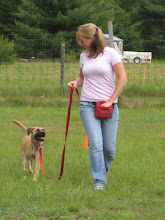and then decided that I would love to work there part time. I really love being there. Sure, there are a lot of frustrations but I enjoy learning new things and even more than that, I love feeling useful. Recently, I have started offering official behavior consults there. Now, mind you, these aren't full consults but rather these are mini in-office consults that help people get started on the right track and they help us determine whether a full in-home consult is the next step. I just can't do a full helpful evaluation in the veterinary office where the pets are already stressed and out of their home environment. However, if there are financial constraints or you want to get a feel for my methods, or you have problems that are specific to coming to the vets office, then I certainly think that's a great starting point!
Even more recently, I have started putting together presentations for the staff. Sure, I've been teaching them things here and there and hopefully they've been able to listen in on some of the tips I've given owners but what better way to feel like I have an important skill than to pass what I know on to people who work with your pets every day and people whose advice you trust.
For example, many people have asked about giving anti anxiety meds to their dogs. This is something that is misconstrued as being a "fix" for fearful or aggressive dogs. There have been many studies to prove that you can not just medicate your dog without behavior modification. This is something that is important for the staff to understand. Puppies with housebreaking issues. Staff who are all on the same page... helpful, right?
Most importantly, in my opinion, veterinary staff who can read subtle body language and who know how to go about decreasing stress in practice. I find that to be the best thing I could ever teach them. It not only avoids injury but it allows them to help your dogs behaviorally as well as medically. If you don't think this is important, ask how many dogs are euthanized for biting, house soiling, or running away from their owners and getting hit by a car. Behavior is JUST as essential as all other medicine and I know that has been overlooked.
Just recently, we started putting towels over cages of stressed cats (and dogs), we have started giving cats hiding places under towels for their exams, we have asked more specific questions about pet behavior when getting a history, we have used calming caps, we have started playing calming music in our kennels for patients who need to hang out with us for a while, we have put towels and mats on our metal tables (which can be scary in themselves), we have started approaching pets differently, we have used more treat rewards for well visits and vaccines, and too many other things to list.
If every time I went to a specific house or store or environment, something scary or threatening or even just unfamiliar happened, I would hate it there too. I would avoid going in and I would probably bite - wouldn't you?! We forget that our pets think very differently and what seems like no big deal to us is in fact the biggest of deals to them!
Lots of good stuff to come at our practice!









Post is Really Good..Our behavior contracts, charts, & other highly-effective parenting tools will help transform you into a more effective, confident, well-equipped, & connected parent.
ReplyDeletebehavior contracts